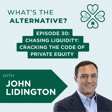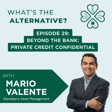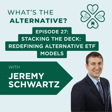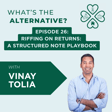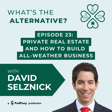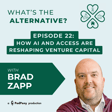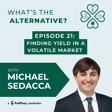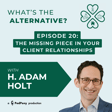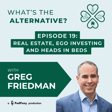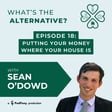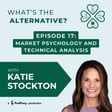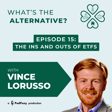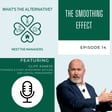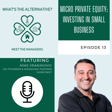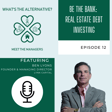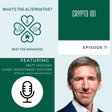Become a Creator today!Start creating today - Share your story with the world!
Start for free
00:00:00
00:00:01

What's the Alternative? | Episode 16 | Tony Davidow's Guide to Private Markets featuring Tony Davidow
In this episode, Shana talks with alternative investment strategist Tony Davidow from Franklin Templeton about the value of alternative investments. Tony shares stories from his career and explains how investments beyond traditional stocks and bonds—like private credit and real estate—can build wealth and support personal goals. We also discuss new ways for everyday investors to access these options, and Tony offers tips for advisors on guiding clients through this evolving investment landscape.
Connect with us below!
- Tony Davidow on LinkedIn
- Private Markets by Tony Davidow
- The Alternative Allocations Podcast
- Shana Orczyk Sissel on LinkedIn
- Banríon Capital Management
Transcript
Secondary Market in Private Equity
00:00:00
Speaker
every other market as they have matured over the years, you developed a robust and reliable secondary market to match buyers and sellers. Why would it be any different in private equity?
Podcast Introduction
00:00:11
Speaker
place go welcome to bonrun capital management's what's the alternative podcast join host shana orzis siil the Queen of Alternatives and founder, CEO of Bonner & Capital Management, as she interviews leaders in the alternative investment space, learn more about their firms, their passions, and about the many different ways investors can use alternative investments to add value in their investment portfolios.
00:00:40
Speaker
Welcome, everyone, to What's the Alternative, the show where we interview experts in the alternative space ah to help you better understand some of the nuances of the industry and the practitioners that are allocating to the space.
Meet Tony Davideau
00:00:54
Speaker
Today, we have with us Tony Davideau. Tony is an investment strategist with the Franklin Templeton Institute ah Specifically, he ah is responsible for leading their efforts as it relates to alternative investments, developments, and strategies, um as well as to ah provide the team at Franklin Templeton ah an idea of what's going on in the space ah so that they can be ahead of the trends and understand what advisors and their clients are looking for in the space. So with that, welcome, Tony. It's very nice to have you here. Thanks so much for having me. This is great.
00:01:32
Speaker
One of the things people probably don't know is Tony and I go back a long ways. ah So long before Tony was at Franklin Templeton Institute and way back ah like financial crisis time, ah Tony was with an organization that was spearheading efforts on providing liquid alternative strategies for ah retail investors and financial advisors um and I had just left Russell investments and had a lot of knowledge of how to do hedge fund replication and um that was kind of what was driving some of the early product development ah so we met at a road show a million years ago.
00:02:13
Speaker
uh for that firm and um you know i followed him ever since and i think it's kind of a mutual thing and we're both very involved in the kaya association ah so when we reconnected recently i thought i had to have you on the podcast and so i'm really excited to have you here because you really are one of the foremost experts in understanding trends and um the liquid alt space, but also you know you wrote a book about um you know private markets and private equity and private debt and the whole nine ah that I'd love to touch on sort of you know your experience in researching that book and what you found
Tony's Career in Alternative Investments
00:02:48
Speaker
there. But let's just start with how you got into the alternative space and sort of how your career has evolved.
00:02:54
Speaker
Yeah, it's it's interesting. And I think as i I mentioned to you, writing a book is somewhat of a cathartic experience because you really refresh all of your views on things and you you kind of go back in time and start to realize that I've been writing this book for 40 years. I just didn't really realize it because I leverage a lot of the experiences I had with my first job working for a family office where we were big allocators.
00:03:19
Speaker
to private equity and private real estate. That was a big part of our portfolio because of course there we're thinking multigenerational wealth. We were thinking about allocating capital to our charitable foundation so we get fund causes that we care deeply about. So I really began with my first job in the industry you know focused on alternative investments and was fascinated by the private markets and what they could provide, ah ultimately from a wealth perspective, but also giving the ability to give back and to do the things that you care about, which I think is a missing thing. um And Shannon, we'll probably talk about that a little bit. I think alternatives sometimes get a bad name, but alternatives are are just different ways of getting exposure to the capital markets. And they can allow you to do different things with your wealth.
00:04:02
Speaker
because they provide different experiences over time. So I started with a family office, which I think really gave me some great foundation. I think I spent the formative years of my career working at Morgan Stanley, where I ran three primary businesses there, institutional consulting business, institutions, big consumers of alternative investments, and helped educate boards on what roles they play and how to build portfolios, developing their asset allocation, helped them select the right group of managers,
00:04:29
Speaker
and then obviously doing the ongoing monitoring to make sure they're fulfilling their roles over time. um After building a business from scratch into a pretty sizable business at Morgan, I was asked to run a little business that we just acquired called Greystone, which is a multifamily office boutique. And really what we got with Greystone was um access to third party due diligence and research on hedge funds and private markets. And and to Morgan Stanley, that was a really important juncture for them because it really provided open architecture where prior to that, we had great traditional third parties, but most of our alternatives were internally grown. Nothing wrong with that, but it was better to have a more robust and broad menu. And then at the end of my tenure, I was asked to run sales and training largely because I had the experience and largely because the firm wanted to help elevate the skills of the advisors so that they could use these more complex tools in a more sophisticated way. And I think that's,
00:05:27
Speaker
After leaving Morgan, i I joined a little startup and then I was a strategist at firms like Guggenheim and Schwab. And I think like you, I have been in the industry writing and talking about alternatives. It seemed like from my whole life, but it's something I believe in and it's something that I think provides a tremendous amount of value for advisors and the clients that they serve. And I think the work that you and I and Kaya and others have done have really just helped to elevate this where it was probably more of a discussion in a back room before Now it's center stage at virtually every conference and advisors are clamoring to get more and more information.
Advisor vs Institutional Strategies
00:06:02
Speaker
Absolutely. And you have a similar story to me where, you know, there was um working as an allocator in the advisor setting and then working as an allocator on the institutional setting and the drastically different experiences, you know, talking to an individual person or family versus a, um you know, endowment or a foundation or a pension fund. um I always like to say the pension fund, the endowment is not emotionally attached to those assets.
00:06:32
Speaker
at all. So decision making is not being driven by any kind of emotions. Most of the time they would never fire a manager for performance because if they did their work right and their consultants did their work right, they understand performance expectations. and More often you are fired because something is going on operationally and or you stopped following the mandate that they hired you for um and then on the advisor side things are actually driven more by emotions and connection to the money um and so those types of clients are different and require and a different approach and that is how those are the clients that most of the advisors out there deal with and so
00:07:16
Speaker
what had been working and how people approach the institutional side doesn't really work for the advisor market. Would you say that that's been your experience as well? Yeah, it's it's interesting, because I think as an industry, we've often led with you know lessons learned from institutions. And I always start by saying, I can talk about David Swenson and Yale all day long. um But the reality is Yale is very different than the individual investor. One, they have their time horizon as perpetuity. ah Two, you're exactly correct. they They don't have that emotional attachment. Money is to fund their causes, their charities. ah It's the ends to the means.
00:07:56
Speaker
But there are lessons to learn from institutions and family offices, which I certainly try to share with advisors, many of whom haven't had long histories dealing with alternative investments. So i like I like to kind of set it up. There are lessons to be learned, but let's understand what's different about it too.
00:08:12
Speaker
The other big difference, of course, with individual investors are taxes. Taxes and emotion are things that we need to think about.
Liquidity & Tax Considerations in Private Markets
00:08:19
Speaker
When we're talking about private markets, we need to think about time horizon and illiquidity, where Harvard and Yale may lean into it and say, I love the fact that there's illiquid pools of capital.
00:08:29
Speaker
because it keeps me disciplined. And that's something I put away for a long period of time and I know I'm going to be handsomely rewarded. But we know individual investors, that's their biggest challenge. And advisors, um ah because they're responding to the emotional stimuli of their clients, it's a big issue for them too. So a lot of similarities, but a lot of differences as well. And I think it's important to be mindful of both.
00:08:52
Speaker
Well, I think you hit on something really important with that liquidity and tax discussion. um One of the things that we've seen over our career, um because it's basically been happening since we kind of got into the industry, is this um evolution and democratization of alternatives. right so you know back in the 90s, it wasn't so easy for just anybody to be able to access alternative strategies. And that has changed drastically. Access is not an issue as it once was for you know traditional retail clients and their advisors. um And um from that perspective, that means that there's a lot of opportunities, but there's good and bad things that come with access. And some of it has to do with it is a very vast universe. a And B, um I'm not sure if advisors out there understand that because of the evolution of liquid alternatives, interval funds,
00:09:48
Speaker
closed end funds, tender offer funds, um you know mutual funds, ETFs, and the like, oh they can look and talk to their clients about liquidity ahead of time and then go and find products that will match that sort of liquidity need or budget of the client. a As you kind of look at the landscape right now, yeah know where are you seeing trends and how do you um advise advisors ah to talk about these two topics with their clients, liquidity and taxes?
Interval & Tender Offer Funds
00:10:16
Speaker
Yeah, it's it's really at the centerpiece of a lot of the discussions we have. you know when The way that I typically think about it is, and in private markets, maybe it's a little bit different than then in hedge funds and the first generation of liquid alternatives. So if you indulge me a little bit, maybe I'll just talk about private markets. So with private markets, of course, they were very limited and only available to qualified purchasers, $5 million or more in investable assets or institutions, long lockup.
00:10:43
Speaker
works fine for institutions and family offices, but not for advisors. Consequently, advisors really didn't have a lot of experience allocating capital to private markets as much as they wanted to, and they recognized the value of private equity. It was really very difficult to do. And if they could, it was probably a small subset of their overall book of business. And I think we learned our lessons with you know the the first generation of products and If we're honest, we had mixed experiences with liquid alternatives. Some worked well, some not so well. Certainly there are limitations in the ability to use leverage and transparency can be good and bad. So there's all sorts of trade-offs. I think what's been interesting in the last couple of years is the growth of these hybrid solutions, whether we call them registered funds, which we do.
00:11:29
Speaker
or interval or tenor offer for funds. I'm fine with interval tenor offer funds. I'm fine with evergreen or perpetual funds. I don't particularly like semi-liquid because I think what you could get the inference is that the fund is liquid, meaning the underlying investments are liquid, where the reality is you're still investing in illiquid investments.
00:11:50
Speaker
But the way I think about interval and tender offer funds is you have a safety valve. You have a quarterly safety valve. If for unforeseen events you need to have access to your fund, you can't get access to them. But I still think that individual investors and advisors should think of them as long-term investments. If I want to capture the long-term illiquidity of private equity, I need to think of that as being a seven to 10 year investment. I can't think of it. I'm in today and umm I'm happy tomorrow and I'm out of it.
00:12:17
Speaker
And if I can go on a little bit of a tangent, I think this is one of the discussions, they end up having with the Rogers a lot as they push back and say, oh, illiquidity, that's a bad thing. I think we should lean into it. Shana, you and I have been doing this for a long time. And I've never sat down with a client that said, I'm a short term investor and I'm going to run for the exits every time after the volatility.
00:12:38
Speaker
you They all say they're a long-term investor, but in fact, they do act on those emotional stimuli. So wouldn't it be great if we could instill a discipline in them, establish in advance an illiquidity bucket, establish that 10 to 20% that you put aside, they say, that capital is there for the long run. That's my true patient capital. I've got to hold that for seven to 10 years.
00:12:59
Speaker
And then if I get emotional, I can be a little bit more tactical or defensive with my traditional investments. I can lessen my ah equity exposure, I can increase my bond exposure, I can sit on gold or cash, but teach investors to be truly long-term investors with that portion of the capital that we've defined as being patient capital. I think that'd be a good thing for the industry, but I think we need the advisors to embrace it and the advisors to lean into something that feels awkward because they know what's the best thing for their clients. I completely agree. um I talk a lot about having advisors speak to their clients about liquidity budgets ahead of time and coming up with a conservative amount where they feel really confident and their client feels really confident setting aside for illiquid opportunities. um And to your point with the interval funds, there's a safety valve, but it's not like
00:13:53
Speaker
they could get on any given quarter all of their money out. um And that's an important caveat. Sometimes the private funds i have more healthy secondary markets um that could be a better safety valve. And that's a discussion that has to be
Connecting Clients to Alternative Investments
00:14:08
Speaker
had. um But I completely agree with you about discussing liquidity. But you kind of touched on this when we on first started. and And you kind of talked about it. I thought this is where you were going to go here. um But I know we agree on this, is that um One of the ways that I advise advisors to start this discussion with clients that maybe aren't super comfortable with illiquidity and maybe aren't as open-minded about it, but you want to have the discussion anyways, is to start by talking about an alternative investment that will um um really connect that client to the underlying investment. And really, it's only in the alternative space that you can do that.
00:14:50
Speaker
So you know the the topic du jour today is sports rights. um That gets people excited um and nobody cares about liquidity if you tell them about a sports rights fund, but there's things like wine funds and there's things like workforce housing. If somebody's really passionate about improving community development to make housing affordable, there is community redevelopment um types of real estate.
00:15:14
Speaker
And there's a million different ways that you can find alternative products that are going to really connect with a client on a personal level, which makes that entire discussion about liquidity a little bit easier. Would you agree? 100%. And it's interesting, as you were saying that, I was thinking about as I was writing my book. And one of the things I wanted to do in the beginning was you know We live this every day. We speak it every day. Most of your listeners, I suspect, live and breathe this so they're comfortable with all the jargon that we fall into. But I know standing in front of a group of clients, I could see theirli their eyes glaze over. A lot of times they don't understand it. So you're exactly right. If we can make it relatable for them,
00:15:57
Speaker
and give them examples. So when I talked about, you know, when I was writing in the beginning of the book, and I wanted to define the world that we're talking about, I gave examples of Google, I didn't just say, you know, private equity is delivered, you know, a 300 basis point illiquidity premium, clients odds are going to Is over there gonna say what's an illiquidity premium what if i could give examples of how google and amazon where. Small companies with ideas and how capital help build those companies and maybe some adult supervision came in to help them manage through the IPO process and then.
00:16:32
Speaker
flourish when they hit the public markets and they could um in fact go out or raise capital and make acquisitions and actually provide a kind of the journey of those company from a small VC idea into a company that they would recognize, I felt that that would be more relatable. So throughout the book, what I tried to do, even though it's primarily targeted for advisors, is I also wanted to give those sound bites for an individual investor so that they know what they're talking about.
Simplifying Investment Discussions
00:16:57
Speaker
I think exactly at to your point, if you can make it more relatable, it feels comfortable. When it's all this Greek that we fall into, it's intimidating. And you know a client may have a lot of money because they sold their business, but their singular focus was their business. And they don't necessarily know investments the way that you and I do. So the more that we can make it simple and relatable, which is hard to do,
00:17:20
Speaker
yeah um I think the better it is for the advisor and the better the advisor is when they have the discussion with the individual investor. So I think the one thing I always try to do is I try to, the temptation is to fall into our jargon because it's our comfortable language. But as much as I can, I always try to give examples so it's relatable because I know that that advisor has to have a discussion next with their client who isn't as sophisticated, doesn't understand it.
00:17:47
Speaker
I love the sports analogy because you're right. There, nobody's thinking short-termism. People are saying, well, I want to have a piece of the New York Giants or the Dallas Cowboys or you know whatever the du jour franchise is. and I think the more that we can make things relatable to them, the better it is all around because then they also understand what it is and what role ultimately it plays in a client portfolio.
00:18:12
Speaker
No, I absolutely agree with you. I love the sports rights one because um and early on in Bonrin, we had the opportunity to kind of talk to ah somebody who had a sports rights fund they were raising. And I sent out kind of like a tester email to the advisors I knew to see like how they would react and to a man. All of them were like, where do I invest? like but Who cares about my clients? I want to invest. And and it just um created this this idea in my head where like, oh, okay, i this this gets people excited and nobody's asking me what what the minimums are, what the liquid and nobody cares. They're just like, how do I get in? um And it it made me think that you know your average client
00:18:57
Speaker
is going to not want to sell their sports rights position that has the Boston Celtics in it, which might be their favorite team because they've already bragged to all their buddies on the golf course how they're a minority owner in the Celtics, right? And so that's the last thing they want to sell because there's something more to that investment than just, you know, part of the financial plan. It's like connection. It's this ability to have this bragging rights or ego, I call it ego investing. But i ego and value investing and value meaning like aligns with my personal values is how I kind of approach it. um But you're absolutely right in that respect. It makes those conversations easier. And then one of the things we do at Bonrion is all of our asset managers that are partners on our platforms, we create storyboards for.
00:19:45
Speaker
to your point, because we want the advisors to have a good story and know how to tell the story consistently using plain language and not a lot of jargon. um They're essentially business development and sales tools. But to your point, it's a lot easier and there's a comfort level that is that that comes from being able to tell a story and not, this is the minimum and this is the lockup and this is the potential. It like it it it makes it more tangible, I think.
00:20:16
Speaker
I agree. I think if we as an industry could collectively just understand that we we lose clients if we start speaking up here. We need to bring it down. We need to make it relatable. We don't have to show them or tell them that we're intelligent. they They understand that. We need to show them and tell them what value this has in their portfolios, how the investments work. I think about private markets really as no different than public markets.
00:20:45
Speaker
It's just a different place in the cap stack and you know the capital structure. and At the end of the day, I think that we need to simplify it so investors understand what they're investing in, what role it plays in the portfolio, why they have it there, can they measure the results, which I know you're something you're very keen on.
00:21:03
Speaker
can we measure is it doing the job it's supposed to do in a portfolio on an ongoing basis and then ultimately we get them thinking about the whole portfolio rather than you know how come my one manager didn't outperform the s and&p 500 now maybe that maybe they're not just designed to do that you know maybe it's a private credit manager because we want to have more income in our portfolio when we want to diversify away from our
Illiquidity Benefits & Private vs Public Markets
00:21:27
Speaker
traditional holdings. So the more that we can get everyone kind of moving the same direction, and that's why I think your podcast is such a great thing, you can reach a great audience, you can give them the simplified sort of way of looking at it. But I think it's an industry challenge. And the one thing that I find comforting is it seemed like we as an industry are all waking up that we're all in this together.
00:21:46
Speaker
Yeah, and this, I think, is a really good segue. you know When we were talking about liquidity, um and then you started talking about like private credit and why we might own something like that, I always like to tell advisors that you got to kind of think about you know what the big picture is here, right? So when something is a liquid that also tends to make it um less efficient,
00:22:07
Speaker
right um So you the greatest rewards and returns typically come from the place where there's less price discovery and illiquidity is a place where there's less price discovery because you're not constantly and by the second getting bids and asks. That's just not how it works.
00:22:25
Speaker
um So there's a benefit to that. That's why you want illiquidity. That's why we expect greater returns from illiquid investments. And then also in that same vein, and you and I have talked about this so with Kaya, and I'd love for you to kind of expand on it, is this idea of that alter like their own thing.
00:22:43
Speaker
And that's true to some extent. There's what are called diversifying alts, which are the things that aren't correlated with traditional markets. But then there's just private markets that have less efficient markets, less price discovery, greater opportunity for excess returns, but they're not really diversifiers.
00:22:59
Speaker
I think if we just think about the public markets, the public market has been shrinking pretty dramatically, right? It's 4,000 companies half the size that it was a decade ago, right? It's it's shrinking. and And the reality is it's really historically it's been dominated by a handful of stocks, right? All we've been talking about is the magnificent seven. So 4,000 shrinking, getting smaller. Private markets growing and getting bigger.
00:23:25
Speaker
And you know if I just do a compare and contrast, the private markets today are private companies. There are 19,000 private companies with 100 million or more in revenues in the US alone. So 90% of the market is private.
00:23:40
Speaker
real estate. 90% of the real estate market is private. Publicly traded REITs are a small fraction of that. That's 10%. So again, there's this growing pool of private companies, but you're right that they're not all great. There's there's definitely a skill in selecting those great companies. And I I'd argue something that I think as an industry we sometimes gloss over the easy sort of button is to say we focus on returns a private equity has historically outperformed public markets and and that's it and then we think that's good enough when we walk out of the room. I think the reality is we need to explain to clients why we think that isn't part of it is as you're pointing out.
00:24:20
Speaker
there's less information, which means there's more skill and identify a really exceptional company and maybe helping them along the way. So I'd argue that what doesn't get talked about enough is a private equity fund invests in a young company. And let's just say they're gonna invest in ah in a handful of companies, because we know that some of them will fail. Many of those companies,
00:24:42
Speaker
will succeed, but they will need capital, not just money, but they'll need human capital. They'll need adult supervision, as I like to think about. They'll need an adult to come in, and maybe and they hire a new CFO who understands how to manage the company more efficiently, or maybe you know they shutter a business idea that they were just burning a lot of cash on and it wasn't going to go anywhere.
00:25:04
Speaker
or maybe they decide that in order to compete more effectively, they need to make acquisitions. So a private equity investor and a private equity fund, their skill is evaluating those great companies and then investing with them and oftentimes multiple rounds as they mature. And today they don't necessarily have to come to the public markets, but if they do, they come to the public markets and of course those early investors are handsomely rewarded. But I think there's kind of this this whole mystique around private markets because we don't know a lot about them. We don't necessarily know those household names and we think they're riskier. But to your point, that's where the opportunities are.
00:25:43
Speaker
I like to remind people some of their favorite companies are actually private. I always like on Twitter, occasionally somebody will be like, if there's one private company that you could invest in tomorrow, what would it be?
Attractive Private Companies
00:25:55
Speaker
And seeing what people's responses are. and a lot of i I always have two responses, and and one always ends up in the mix, and that's Chick-fil-A. The second is I always like to point out that Fidelity is a private company. It's like one of the largest family-owned businesses in the world.
00:26:13
Speaker
um But there are a lot of businesses that we use every single day. And one of the things that made Peter Lynch so successful was by investing in what he knows, right? Well, the truth of the matter is a lot of what we know is not public.
00:26:29
Speaker
right And so there's something to that. But um you know I think that that's that's really just a really good point about operators. I think that's particularly true in private equity, private credit, two completely different skill sets. Distressed credit requires a very specific skill set. And you know it can't just be done by anyone who's good in public markets. It's a completely different animal.
00:26:53
Speaker
Can you talk a little bit about sort of where you see um that most relevant in terms of today's opportunities? And then I'd love to have you talk a little bit about your book and some of the um the the things and the um realizations you had while writing that book about the private markets and and educating the advisors um out there and their clients.
00:27:17
Speaker
Yeah, sure. and And again, I think, again, you you mentioned in at the beginning, I work with the Franklin Templeton Institute, and um everything that I produce, there's no products ever mentioned in anything that I produce. i and I tend to think of myself as Switzerland. I try to look at the world from an module perspective.
00:27:37
Speaker
So I write white papers or I have a podcast or blogs because I want to help advisors have better informed decisions. um And we do come out with it. We'll come out in January with our outlook for 2025 and then we'll come out with with a major outlook. So if we look at the opportunities in the market today, look.
00:27:54
Speaker
You have headwinds and you have tailwinds, right? We've gone through clearly a ah challenging market environment over the last couple of years. 21 was kind of peak valuation for private markets. 22 comes along. We have rising interest rates. We have inflation to deal with. And then we had a little bit of a snapback in 23 at 24.
00:28:12
Speaker
But I would say at the top of our list, what we probably like the most is secondaries. we We think secondaries are really attractive. And part of the reason secondaries are attractive is because private equity is a little bit challenged, right? It's a little bit stalled here. You have stalled exits. You don't have M and&A activity. We think M and&A activity may pick up. We think IPOs may pick up. But we don't think that secondaries go away. You mentioned secondaries earlier.
00:28:36
Speaker
and I was listening to John Bowman and his Capital Decanter podcast, and he said something that I had been thinking about, but I never heard anyone
Secondary Markets & Investment Opportunities
00:28:46
Speaker
really articulated. It's just the secondary market is the natural evolution for private equity. I mean, it really is when you think about it. Every other market, as they have matured over the years, you developed a robust and reliable secondary market to match buyers and sellers. Why would it be any different in private equity?
00:29:04
Speaker
So I think what has happened recently is you've had a lot of capital flowing into private equity, you installed exits, you don't really have the distributions going back to underlying investors. So big institutions are saying, I need to, because I've already committed to the next three deals, I need to find ways of getting liquidity in my portfolio.
00:29:23
Speaker
secondary manager step in. So we really like the secondary space. um Again, even if exits pick up and M&A m and a activity pick up and IPOs pick up, we still think secondaries perform a vital cog in the overall ecosystem. Private credit we like.
00:29:40
Speaker
and And I will tell you, we like direct lending, more conservative. We like distressed, but only with experienced managers who can potentially have a workout team. But an area that's maybe a little bit different than a lot of other people is we like real estate debt. So think about the private credit market was really born out of the disruption that came out of 2008. Bank stopped lending, private credit manager stepped in to fill the void. We see the same sort of um market environment today with what has happened with the SVP.
00:30:10
Speaker
And what is the concern with real estate is banks are not going to lend to real estate. They're just very leery about it. Nobody wants to have a real estate asset on their balance sheet. So I think private credit managers, if they could be smart about it, can find really interesting opportunities in real estate debt.
00:30:28
Speaker
kind of a counter call, but but again, I think that's where the opportunities are. When it is difficult, when there's disruption, when there's blood in the water, that's often when you find the best opportunities. I would say we haven't given up on real estate broadly. We like real estate, but I think offices will continue to be a challenging sector. So we like industrials, multifamily, life sciences. So I think you need to be a little bit more selective when you look at that.
00:30:52
Speaker
Yeah, it's it's funny. On the Bonrion platform, our three most popular um partners right now, the ones that advisors are most interested in speaking to, are a real estate debt fund, ah Link Capital, um a venture capital almost secondary-ish fund called Vested, which by helps employees exercise their options when they exit a startup. um And instead of loaning them the money, like a lot of other firms have done, they actually take a piece of those options and put it in a fund. ah So they get access to a lot of you know the startups that
00:31:28
Speaker
that you normally wouldn't get access to unless you could invest in the Sequoia Fund. um And then um we have a direct lender, um lower middle market, small business, and you know we really talk to our advisors and their clients about that one in the sense of like it's supporting small business ownership and small business growth.
00:31:48
Speaker
um and And that's what you're really investing there. And that really resonates a lot with advisors that have entrepreneurs that they work with. So the things you talked about are right in the sweet spot of where we're actually seeing interest too. um And I think your comments about secondaries are really interesting.
00:32:05
Speaker
you know I think the public markets are like the biggest secondary market there is if you think about it. I mean, that's exactly what they are. um And so creating some sort of secondary in the private markets is really interesting, but it will always, because of the liquidity, you'll always be buying that at a
Smoothing Effect in Private Equity
00:32:23
Speaker
discount, right? Because you're helping somebody who has a need and you're providing them, you know, liquidity for that need and and you get paid for that. um So there's, in my mind, I ah completely agree with you in terms of
00:32:36
Speaker
the potential for you to be able to participate in private equity deals at a better ah better um multiple than you know the original investors. And that is advantageous to a lot of people and that that can be really a good thing for your portfolio. um And I think you talked a lot about those markets, which tend not to be evergreen.
00:33:01
Speaker
um And that gets us into where there's a lot of debate, and you and I were talking about this before we started recording, which is this idea of, as Cliff Assness likes to say, volatility laundering, but the you know you though politically correct word is smoothing effect.
00:33:18
Speaker
um And whether that's a good or a bad thing, I can argue that, yeah, um the negative of that is that you don't necessarily have to mark the market every single day. um And so there's ah the ability to look less volatile than perhaps you truly are. But um from an advisor perspective, from a client perspective, the behavioral uh influence of that is not a bad thing um you know what you don't know um is in some cases a good thing and i remember being on the compound in friends with michael batnik and josh brown last year and michael said wouldn't it be great if i could just invest in the smp and then like i couldn't sell it and somebody just locked me up and i couldn't even look at it i was like well welcome to the world of private equity
00:34:06
Speaker
It's pretty much what they're doing because it's taking the ability for you to panic sell out. um And I think that that's really interesting. But I'd love to get your thoughts on this idea of the smoothing effect. And I'm going to call it the smoothing effect and kind of how advisors can talk to their clients about this idea of the fact that it doesn't mark the market every day. But that doesn't necessarily mean it's less volatile. It's just you don't actually experience the volatility.
00:34:30
Speaker
Yeah, I think it's something, as an industry, I think we need to kind of figure it out a little bit better. So I will admit that um mark to mark probably understates volatility. um I just don't know how much. And I'm careful of just this this whole notion. and There are people who are passionate about you have to just smooth everything.
00:34:52
Speaker
you adjust for autocorrelation now to get overly geeky and all of that. But it depends how you do it. So let's just say hypothetically, private equity vol is eight. If you wanted to just smooth it and all of a sudden, you know, it's 12, I could live with that.
00:35:08
Speaker
But if you do smooth it in such a way that it's 25, I don't think that that's representative of all the volatilities either. So there's there's not a consistent way across the industry of doing that. i've I've worked with firms where, you know, we came up with methodologies and maybe we do a little bit of an averaging on it. What I do is I talk to advisors about it and I just, I'm very honest about it. Yes, there's a mark to mark issue, right? They don't price daily. like By the way, the flip side of it and Joshua probably appreciate this is,
00:35:36
Speaker
I don't know that we want clients looking at the volatility intraday with all the bouncing around. A hundred percent. That's the behavioral aspect I was just talking about. that That's where the panic sets in. Overstating the vol of the public markets. But but I think the reality is I'd rather just be transparent about what it is, which is you need to ask, you know, I can provide analysis on what the overall market looks like and what the long term data looks like.
00:35:59
Speaker
And by the way, we only use, and I know you and I have had discussions about data, we only use real data, which I think is a challenge for a lot of advisors. You know, I caution them, don't use synthetic data, don't fall under the trap of trying to use small cap and use a magnifier effect, and because they're not small cap stocks, right? Use what they are. So we actually spend a lot of money to get really good, reliable data, and then just point out the limitations in there.
00:36:24
Speaker
So we're we're we're kind of on the fence on this de-smoothing. We don't like it the way that it's just done arbitrarily. I wouldn't be opposed if there's an industry standard that we all came up with where all the data was de-smoothed in a similar fashion and you increase the vol a little bit, but you don't completely distort what is going on in the marketplace. Because I think the reality is if you buy and hold those assets for the long run,
00:36:48
Speaker
you're getting the experience, right? You're getting that experience over the long run. I just don't know that we have to artificially manipulate the data to provide higher volatility. So I just try to be as transparent as possible with some of the limitations of looking at all the information we look at.
Transparency & Due Diligence
00:37:02
Speaker
the other The other thing that I know you and I talked about in our last call is, you know, advisors also need to rep,
00:37:10
Speaker
they need to get comfortable with the fact that data is going to be one or two quarters late. Private equity data is going to be one or two quarters late. If you want real private equity data, if you want to deal with some sort of synthetic proxy, you know, go ahead. But I don't know if that's the real experience over time. So it's definitely a discussion we need to have with advisors around data in general. I'm hopeful that maybe as an industry, we start to better align around this. We've seen some interesting acquisitions over the last year or so, where traditional providers have bought some of those great private market data. And if we start to think about how that could be used more efficiently, I think that'd be good overall.
00:37:48
Speaker
Well, there's two things you said there that I really love. First is I love the idea of kind of setting expectations where private market data is probably understated vol and public market data is probably overstated, right? Like if we didn't have inter-day volatility and then we were just like, what did we open out? What did we close at? I bet you like that would make a difference. But that's just is not how it works. um And to your point though, um kind of going in eyes wide open where like you know neither one's probably a reflection of the true reality of the experience. um And I always like to say that um ah if um if somebody gives me a hard time about how their investments are doing, I always say, I'm going to change your password.
00:38:32
Speaker
um to your account so you aren't looking at it every day because the only reason why you're freaked out is because you're looking at it like every hour, um especially when markets are difficult um because of the behavior and stuff. And Shanna, if I could, because I think you kind of look at this as well. I will tell you, there are some, I know managers, we have managers um that, price you know, they do mark to mark independent price on a quarterly basis. It's very reliable. And there are some that price thrown security. So there's a lot of, there's a lot of dispersion around the way that you restate data too. So I would just say, that's why I think it's difficult to just paint everything with the same brush. So my response for an advisor is ask the fund, right? right to Kind of the research to say, you know, we'd like private market and here's why, but don't invest before you ask those really tough questions of the fund because everyone does it in a different way.
00:39:27
Speaker
yeah And I suspect the managers on your platform, there's probably a fair amount of dispersion in the way they price and and the frequency and the methodology. No, absolutely. It's actually a whole section in our due diligence questionnaire that we provide our advisors. Any manager on our platform we complete the due diligence on and we provide that due diligence directly to the advisors at no cost. um So they get a DDQ and a DDR and in the DDQ there's an entire section about pricing methodologies where we ask managers to actually answer that very question. And in the private side, yeah, there's a wide variety. Some have
00:40:03
Speaker
very specific third parties that come in and do the pricing on a certain cadence and then there are some that are like no you know we do it ourselves and our accountant kind of figures it out and it's a little more squishy from that perspective and then anytime that that happens we always note it in our due diligence reports there's a section we do at the end where we put key considerations and a lot of times that's things about pricing liquidity taxes and um um ah Redemption programs. ah Those are the kind of the key areas we like to highlight if there's something unusual there um that we think is worth pointing out. um And to your point, um in the non evergreen space, in the space where you're dealing with
00:40:45
Speaker
underlines that's pretty illiquid, that matters a lot. um It doesn't necessarily mean your returns are going to be better or worse, but you know what you see and how you see it and how it could potentially be manipulated can be very different depending on the answers to that question.
00:41:03
Speaker
yeah Yeah, so I think that that's a very good point. Well, tell me a little bit, you know, as we're coming up on 45 minutes and want to keep these podcasts like very easy to listen to and not too long, ah because we know some of the stuff we talk about is a little technical and heavy and nobody wants to listen to that for two
Tony's Book & Future Predictions
00:41:23
Speaker
hours. um I'd love to get your thoughts kind of on, you know, you didn't really touch on this just yet, but I'm going to ask the question again. What were some of the, when you were writing your book?
00:41:34
Speaker
What were some of the realizations you had through that experience that um you know really helped evolve your view on alts really helped you feel like you had a better foundation or surprised you.
00:41:49
Speaker
Yeah, I don't know if there's anything new. I mean, ah again, i I think I made a comment. you know I felt like as I was writing the book and you start to memorialize and put it down, I kind of felt like I'd been writing this for 40 years because I reflected on my journey and how things have evolved over time. Look, everything has evolved. that that's That's a good thing. For people like you and I, we love change. It's a challenge. Others feel threatened by it. um But I think what was interesting is as I was starting to put things on paper,
00:42:17
Speaker
it really fit well together. So I i write a lot now. So, you know, not a huge stretch. I write, it you know, 3,000, 5,000 word white papers, 1,000 word blogs, and here I write a 65,000 word book. You know, it's a little bit different. But I always felt like often when I finish a paper, I feel like there's like there's more to say.
00:42:36
Speaker
With a book, you have the ability to have a longer arc. So I can have a deep dot. You know, I have a whole chapter on secondaries. I have a whole chapter on TPA, a topic that you and I spoke about. I have a chance to have kind of a deeper dive on this. I have the ability, because it's a little bit longer, to use more case studies to illustrate, you know,
00:42:55
Speaker
those examples I gave earlier about using Google and Amazon to illustrate kind of the journey that you go on from BC to reaching the public markets and how private equity managers come in to help kind of fuel that growth over time. So it just gave me a longer lens to tell that story and and I thought that was really good.
00:43:15
Speaker
And then as you get towards the end of the book, I didn't want it to just be a regurgitation of what happened. So my last three chapters are kind of peering into the future, which was to me the the most fun part because you and I probably think about it every day and probably the people that we all know collectively, we're always thinking about what is the next decade look like and all of that. But when you put it down on a piece of paper, now Mexico to be held.
00:43:39
Speaker
accountable for it. So, you know, i'm I'm thinking through a lot of these thoughts and I bounced ideas off a lot of our mutual industry friends to to get them. but yeah I've been thinking that product evolution is going to evolve, but I don't want it to evolve where the expectation is we're going to be 100% liquid. that That's not going to work for private markets.
00:43:56
Speaker
ah I think that we're going to go from 5% allocations to private markets to 15 to 20, but I know it's not going to be a straight line. I know there's some challenges along the way, so what will be those key inflection points? Maybe better pricing, ah maybe better transparency on the data. The topic that you and I talked about, we need to get individual investors and advisors comfortable so they trust us more.
00:44:19
Speaker
So at the end, when I was trying to tie it together and think about, well, how do I get to where I think we need to be? And what are some of the key inflection points? That that was really kind of a fun exercise for me to go through, because I think we can all imagine 10 years down the road, but it won't be a straight line. There's going to be regulatory sort of issues we're going to have to overcome. There's going to have to be some better education of advisors and investors. We spend a lot of time talking to advisors.
00:44:46
Speaker
the investors still need a lot of help, right? They feel intimidated and if they feel intimidated, it feels riskier. So we've got to get them comfortable with it as well. So it was kind of a great journey to go on. And as I'm thinking about all of this, um I just realized it had been something I had been thinking about. This is my second book, but this felt like it was kind of my my whole career kind of wrapped up.
00:45:09
Speaker
Yeah, so before ah we let you go, as enjoy the rest of your day, I want to to to answer two questions for me. Number one, we're gonna include links to your book and the show notes because I think ah it's a tremendous resource and any advisor out there interested in understanding some of the basic tenets of the space, this is a great resource for you. ah But secondly, what other resources do you recommend um for advisors and Third, how do advisors connect with you to get your research, to listen to your podcast, and so on and so forth? Where can they find you? Yeah, so a couple of those are connected. So you can go to AltSpyFT. We have a Knowledge Hub. The Knowledge Hub is just dedicated to my white papers and my blogs. You can sign up for my podcast in there, or you can reach out to me on LinkedIn. As you know, I post a lot.
00:46:06
Speaker
Um, and you know, the beauty is like, like you, Shannon, I'm on the road all the time. So I love like being at a conference and having somebody run up to me says, Hey, I listen to your podcast. I learned a lot. And if you learn a lot from the podcast is because I have great guests. I mean, I figured that out a long time ago. ah But outside resources other than the stuff that we produce, which is a lot.
00:46:25
Speaker
Like you, i I'm very close with the folks at CHI. I think they're doing a terrific job. I'm real excited about how they're starting to focus more of their energies on the Wealth Channel. That's a good thing. I've also been involved in the Investment of Wealth Institute for many, many years. I was the editor of the Monitor, which is their publication that goes out to the 20,000 members. And I know there's a lot of really great content in there.
00:46:47
Speaker
Well, I think the beauty is I think today there's more and more information out there that isn't by my fund. It's really how do we collectively have better discussions with clients about this ever-changing world and these great tools that are really important for helping our clients achieve their goals, dreams, and aspirations.
00:47:03
Speaker
Yep, I completely agree. It's part of what drove me to start Bonran and it's sort of a key component of everything we stand for starts there. um You know, having been an advisor myself when I started in the industry and then having worked with RAAs over the years, um you know, it just to your point about I think we go from five to 15 or 20, but it won't be linear.
00:47:26
Speaker
um I very much agree with you, and but I think the way we get there is to remember that we're not trying to sell product, that if we really want to go from five to 20, it's going to be about really making a case for why this needs to be in client portfolios and then making it available.
00:47:46
Speaker
to as many clients as possible because advisors want to have consistency and their exposures across their book of business. And the only way that happens is if we find new and um you know um innovative ways to provide access. um But to your point, the regulators are always going to kind of be there. um ah to, in some ways, prevent too much access from happening in a space that is complex at the end of the day. Well, I want to thank you for your time. We will put links in our show notes to all of the resources you just
Podcast Wrap-up & Disclaimer
00:48:21
Speaker
referenced. I do highly recommend um listening to Tony's podcast and reading his research. I am a ah big consumer of your research. I think it's very good. It's very aligned. Obviously you and I
00:48:33
Speaker
have gone through the industry through the same time period and the same evolution in many ways, so I relate to it. um And so we'll put that in the show notes and really appreciate the time you took to meet with us today. Thank you, Shannon. This is a real pleasure.
00:48:47
Speaker
Well, thank you everyone for joining us. um And as always, if you liked this episode, please make sure to like and subscribe. ah We would love to get your feedback on guests that you might be interested interested in having on the podcast. So please don't hesitate to reach out. But until next time, I'm Shayna Orzak-Sissel, founder and CEO of Bonner & Calico Management. And thank you for listening to What's the Alternative?
00:49:16
Speaker
The opinions expressed on the What's the Alternative podcast are for general informational purposes only and are not intended to provide specific advice or recommendations for any individual or in any specific security. This is only intended to provide education about the financial industry to determine which investments may be appropriate for you consult your financial advisor prior to investing. Any past performance discussed during this podcast is no guarantee of future results. The guests featured on this program are participants on Bonrion Capital Management's platform. As such, Bonrion may receive payment for their participation as a platform partner. Any indices referenced for comparison are unmanaged and cannot be invested into directly. As always, please remember investing involves risk and possible loss of principal capital. Please seek advice from a licensed investment professional. Investments are not FDIC insured nor are they deposits of or guarantees by a bank or any other entity so they may lose value. Investors should carefully consider investment objectives, risks, charges, and expenses. This and other important information is contained in the fund prospectus and summary prospectuses which can be obtained from a financial professional and should be read carefully before investing.
00:50:41
Speaker
Statements attributed to an individual represent the opinions of that individual as of the date of the published podcast and do not necessarily reflect the opinions of boundary and capital management or its affiliates. This information is intended to provide educational value, highlight issues and should not be considered advice, an endorsement or a recommendation.
00:51:03
Speaker
All Bonrune Capital trademarks mentioned are owned by Bonrune Capital Management Inc., an affiliated company, or its funds. All other company and product names mentioned are the property of their respective companies.
